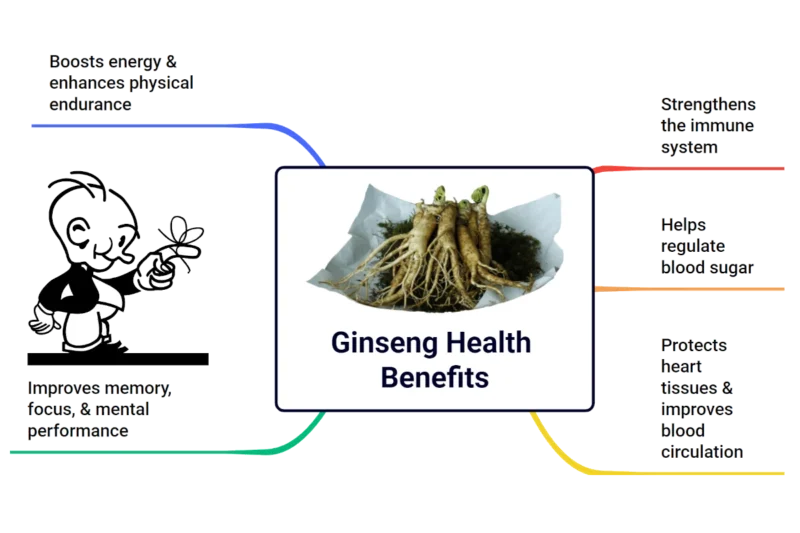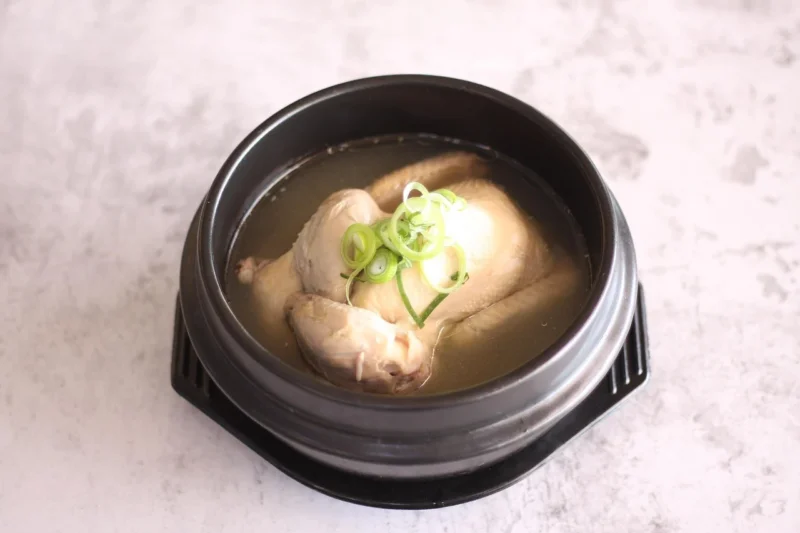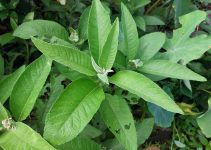Reviewed by P. A. Regoniel, PhD

Many people turn to ginseng for its natural boost in energy and vitality—but how much do you really know about ginseng health benefits and their potential risks? Before adding this popular herb to your routine, it’s worth understanding both its advantages and its possible adverse reactions.
Table of Contents
Ginseng Health Benefits and Adverse Reactions
Ginseng, a well-known herbal medicine, has been used for centuries in Traditional Chinese Medicine (TCM). It is valued for its potential to boost energy, enhance brain function, and support immunity. However, ginseng may also cause adverse reactions and interact with certain medications—so understanding both its benefits and risks is essential.
Ginseng Health Benefits and Common Uses
Ginseng comes in several forms, the most common being Asian ginseng (Panax ginseng) and American ginseng (Panax quinquefolius). Both contain active compounds called ginsenosides and gintonin, which contribute to its health-promoting effects.
1. Energy and Endurance
Ginseng is widely recognized as a natural energy booster. It helps combat fatigue and enhance physical endurance, making it a popular supplement for athletes and those with demanding lifestyles.
Kakunuri, et al. (2025) notes that Panax ginseng has a strong potential as a complementary therapy in modern healthcare for its stress-protective and fatigue-reducing properties. Thus, ginseng for energy drinks, particularly among athletes, can be achieved with ginseng supplementation in their diet.
2. Cognitive Function and Mental Clarity
Studies suggest that ginseng may improve memory, focus, and mental performance. It is often used as a brain tonic to support alertness and reduce mental fatigue.
Lee et al. (2024), after reviewing cohort and clinical studies, found out that ginseng may improve cognitive function in individuals with subjective memory impairment, mild cognitive impairment, and early Alzheimer’s disease. It highlights that both acute (consuming ginseng over a short period—often in a single dose or a brief course of days) and long-term intake of ginseng extracts can enhance working memory performance. While ginseng’s active components, such as ginsenosides and gintonin, show potential cognitive benefits, the specific mechanisms and components responsible for these effects are still under investigation.
3. Immune System Support
Ginseng has potential to strengthen the immune system (Esmaeili et al., 2025), helping the body resist infections and recover more quickly. Regular use may reduce the frequency of colds and flu.
Meanwhile, Zhao et al. (2024) noted that ginseng influences both innate and adaptive immunity.
Innate immunity is the body’s first line of defense against pathogens. It is non-specific, meaning it responds to all pathogens in the same way and does not adapt to specific invaders.
On the other hand, adaptive immunity provides a targeted and highly specific response to pathogens. It involves the development of immunological memory, allowing for a faster and stronger reaction upon re-exposure to the same pathogen.
Simply said, ginseng thus has three-fold effects to the immune system namely 1. enhances a person’s immunity, 2. protects against infections, and 3. treats immune-related disorders.
Also, ginseng has been shown to modify gut-associated lymphoid tissue (GALT) functions, promoting intestinal immune balance. GALT is like the body’s security system for the gut. It constantly watches over what enters through the food we eat to catch any harmful invaders or germs. When it detects something harmful, GALT sends signals to activate the body’s defense forces, like soldiers responding to an alarm. It helps make special proteins called antibodies that act like shields, lining the gut and helping to block or neutralize any bad germs. It educates the immune system about what’s safe to allow, like food and friendly bacteria, preventing unnecessary attacks on these harmless substances.
4. Blood Sugar Regulation
Clinical studies show that ginseng may help regulate blood sugar and enhance insulin secretion, benefiting individuals with diabetes or prediabetes. It also aids muscles in absorbing glucose, helping maintain balanced blood sugar levels.
Esmaeili et al. (2025) reports that panax ginseng is noted for its bioactive compounds, ginseng saponins (GS), which have been shown to possess hypoglycemic (abnormally low level of glucose or sugar in the blood) properties compared to other types of ginseng. It is considered safe for use with minimal side effects.
Ginseng was found to be effective in lowering blood sugar levels, making it a promising natural remedy for managing pre-diabetes and type 2 diabetes. It accomplishes this by enhancing insulin sensitivity and possibly promoting the secretion of insulin (Li, 2024).
Additionally, ginseng foods and medicines, such as teas and extracts, can be incorporated into a diet to leverage these benefits. These dietary forms offer a convenient way to harness ginseng’s hypoglycemic properties alongside its other health benefits (Li, 2024).
5. Heart Health
Ginseng may protect heart tissues and improve circulation. Research indicates that it reduces oxidative stress, supports healthy cholesterol levels, and helps prevent heart disease. This means that ginseng lowers blood pressure towards normal values as a result of improved blood circulation.

Ginseng Side Effects and Adverse Reactions
While ginseng is generally safe for short-term use, excessive or long-term intake may lead to side effects. it may cause side effects like insomnia, severe rashes, and liver damage, and it may negatively interact with autoimmune disorders and certain medications (NCCIH, Drugs.com).
1. Insomnia
Taking ginseng late in the day may cause sleeplessness or restlessness, especially at high doses.
2. Digestive Issues
Some users experience upset stomach, diarrhea, or nausea, particularly when taking concentrated extracts.
3. Headaches
Using ginseng may cause headaches that can vary in intensity from mild to moderate. These headaches can occur on one side of your head (unilateral) or both sides (bilateral).
4. Blood Pressure Fluctuations
It may raise or lower blood pressure depending on the user’s physiology, making it risky for individuals with hypertension or hypotension.
5. Ginseng Abuse Syndrome
Long-term high-dose use can cause nervousness, skin rash, insomnia, hypertension, diarrhea, confusion, and depression—collectively known as Ginseng Abuse Syndrome (GAS).
6. Allergic Reactions
Although rare, some people experience allergic symptoms such as rash, itching, swelling, or breathing difficulty.
Drug Interactions and Safety Precautions
Ginseng can interact with several medications, altering their effectiveness or increasing side effects. Consultation with a healthcare provider is strongly recommended.
Potential Drug Interactions:
- Antidepressants: Ginseng may trigger mania in individuals with depression.
- Warfarin and blood thinners: May increase bleeding risk.
- Diabetes medications: Can enhance insulin effects, leading to hypoglycemia.
- P-glycoprotein substrate drugs: Korean Red Ginseng (KRG) may alter drug absorption.
- Autoimmune diseases: May overstimulate immunity in conditions like lupus or rheumatoid arthritis.
Other Cautions:
- Pre-surgery: Stop taking ginseng at least seven days before surgery.
- Pregnancy and breastfeeding: Avoid taking ginseng due to insufficient safety data.
Conclusion
Ginseng benefits are many. It is a powerful herbal supplement with proven benefits for energy, cognition, immunity, and heart health. Yet, it is not without risks—especially for those taking medications or with pre-existing health conditions. Always consult a qualified health professional before adding ginseng to your wellness routine.
References
Esmaeili, A., Khalili, N., Najafi, N., & Hajizadeh-Sharafabad, F. (2025). Ginseng supplementation and vascular function: a systematic review and meta-analysis of clinical trials. BMC Complementary Medicine and Therapies, 25(1), 259.
Kakunuri, R., Motupalli, C. G., Bathula, A. P., Pandi, H., & Pathan, R. (2025). Panax ginseng: the medicinal herb. International Journal of Indigenous Herbs and Drugs, 28-33.
Lee, R., Kim, J. H., Kim, W. W., Hwang, S. H., Choi, S. H., Kim, J. H., … & Nah, S. Y. (2024). Emerging evidence that ginseng components improve cognition in subjective memory impairment, mild cognitive impairment, and early Alzheimer’s disease dementia. Journal of Ginseng Research, 48(3), 245-252.
Li, W. (2024). Integrating tradition and innovation: Health industry opportunities for ginseng with foods and medicines. Chinese Herbal Medicines, 16(4), 487.
National Center for Complementary and Integrative Health (n.d.) Asian Ginseng. Retrieved October 8, 2025, from https://www.nccih.nih.gov/health/asian-ginseng
Zhao, L., Zhang, T., & Zhang, K. (2024). Pharmacological effects of ginseng and ginsenosides on intestinal inflammation and the immune system. Frontiers in Immunology, 15, 1353614.
FAQ: Ginseng Health Benefits and Its Possible Adverse Reactions
1. What are the main benefits of ginseng?
Ginseng boosts energy, enhances memory and focus, supports immunity, and may regulate blood sugar and heart function.
2. Can ginseng cause side effects?
Yes. Side effects include insomnia, digestive upset, headaches, and blood pressure changes, especially with long-term or high-dose use.
3. Is it safe to take ginseng every day?
Short-term daily use is generally safe, but long-term use should be supervised by a healthcare provider.
4. Who should avoid taking ginseng?
People with autoimmune disorders, pregnant or breastfeeding women, and those taking antidepressants or blood thinners should avoid it.
5. When is the best time to take ginseng?
Morning is best to prevent insomnia. Avoid taking it late in the evening.

